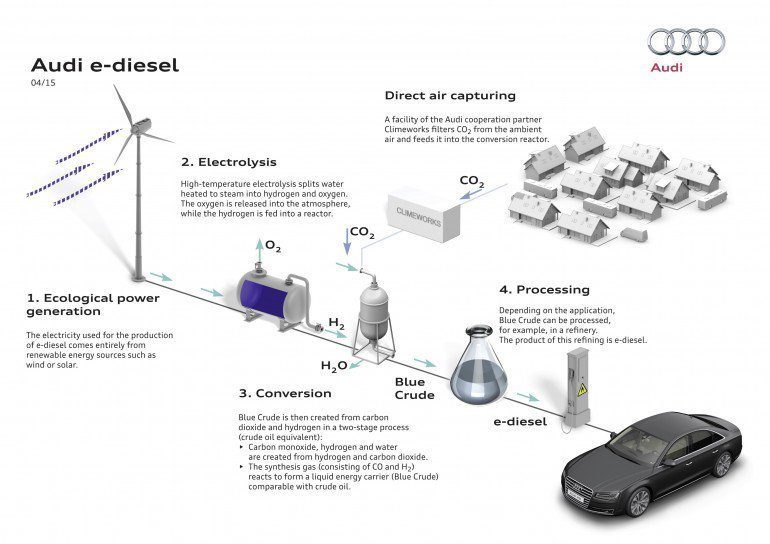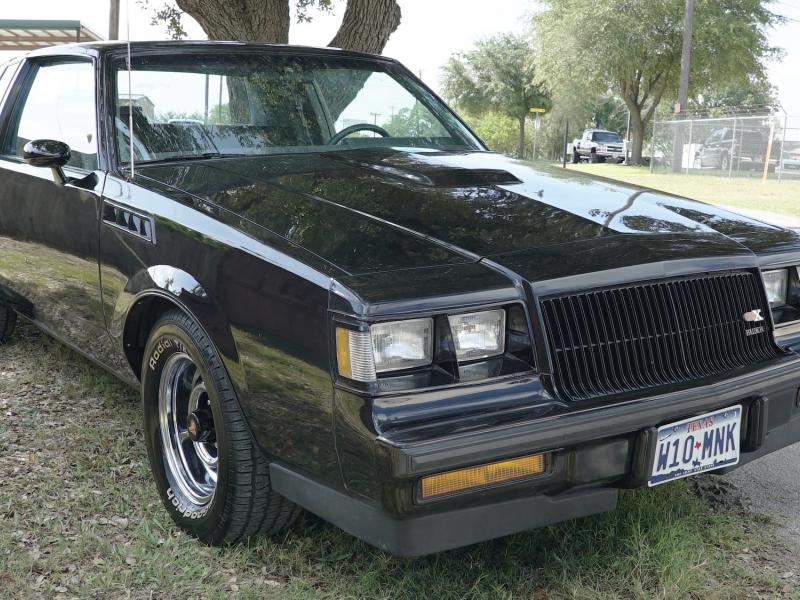Audi Creates Diesel Fuel Solely from Water, Carbon Dioxide and Renewable Energy
Tue, 10/17/2017 - 05:13
Engineers at Audi have reportedly created a carbon-neutral diesel fuel comprised solely of water, carbon dioxide and renewable energy sources. The German car manufacturing giant is actually already using the crystal clear “e-diesel” to power the Audi A8 owned by Johanna Wanka, Germany’s Federal Minister of Education and Research, signaling that the “e-diesel” may not be far from public use.
Sustainable transportation is certainly a major component of the automobile industry’s future, both in the form of solar-powered energy sources and new replications of diesel fuel. Audi’s recently revealed “e-diesel” is particularly exciting because it represents one of the few new sources of sustainable energy that is being embraced by an automotive giant.
Audi seems fully committed to developing the e-diesel, going as far as setting up a pilot plant in Dresden, Germany, which will deliver 160 liters of the synthetic diesel daily.
The Blue Crude
The “e-diesel” is referred to as “blue crude” and is created from a three-step process. First, renewable energy is harvested from sources such as solar, wind and hydropower. Using a process called reversible electrolysis, this energy is used to split water into pure hydrogen and oxygen.
Lastly, the resulting materials are mixed with carbon monoxide, created from the carbon dioxide being harvested in the atmosphere. The carbon monoxide and dioxide react at high temperatures while under pressure, which results in the production of blue crude’s long-chain hydrocarbon compounds.
The resulting product is a form of diesel that can be mixed with current everyday diesel fuel, in addition to being used as a sole source of powering cars sustainably. This graphic showcases the production process for blue crude.
 The Benefits of Synthetic Fuel
As engineers and scientists seek out new methods to create sustainable energy for automobiles and beyond, they continue to hone in on the benefits of synthetic fuel. For one, synthetic fuel is more environmentally friendly while simultaneously providing superior combustion compared to fossil fuels, with the e-diesel’s overall energy efficiency clocking in around 70%, according to a report.
In addition to fewer pollutants, engines with e-diesel will run quieter and require less machine power, resulting in potentially increased longevity for automobiles using it. While this all sounds promising, it’s unclear when the e-diesel may become commonplace in society.
No Known Timeline
The initial factory only pumping out 160 liters per day suggests the e-diesel is still very much in its testing stage. But with giants like Audi and Sunfire aiming to build another factory in the near future, it’s realistic to expect production to ramp up, especially as current gas prices in Germany are much higher than the expected pricing for e-diesel, which would fall somewhere between 1 and 1.50 Euros per liter.
One day in the near future, Audi owners may be able to enjoy driving their cars throughout the countryside without worrying about CO2 emissions they’re producing. Plus, in addition to a decreased carbon footprint, its lower price compared to standard gas can help consumers save money.
The Benefits of Synthetic Fuel
As engineers and scientists seek out new methods to create sustainable energy for automobiles and beyond, they continue to hone in on the benefits of synthetic fuel. For one, synthetic fuel is more environmentally friendly while simultaneously providing superior combustion compared to fossil fuels, with the e-diesel’s overall energy efficiency clocking in around 70%, according to a report.
In addition to fewer pollutants, engines with e-diesel will run quieter and require less machine power, resulting in potentially increased longevity for automobiles using it. While this all sounds promising, it’s unclear when the e-diesel may become commonplace in society.
No Known Timeline
The initial factory only pumping out 160 liters per day suggests the e-diesel is still very much in its testing stage. But with giants like Audi and Sunfire aiming to build another factory in the near future, it’s realistic to expect production to ramp up, especially as current gas prices in Germany are much higher than the expected pricing for e-diesel, which would fall somewhere between 1 and 1.50 Euros per liter.
One day in the near future, Audi owners may be able to enjoy driving their cars throughout the countryside without worrying about CO2 emissions they’re producing. Plus, in addition to a decreased carbon footprint, its lower price compared to standard gas can help consumers save money.
 The Benefits of Synthetic Fuel
As engineers and scientists seek out new methods to create sustainable energy for automobiles and beyond, they continue to hone in on the benefits of synthetic fuel. For one, synthetic fuel is more environmentally friendly while simultaneously providing superior combustion compared to fossil fuels, with the e-diesel’s overall energy efficiency clocking in around 70%, according to a report.
In addition to fewer pollutants, engines with e-diesel will run quieter and require less machine power, resulting in potentially increased longevity for automobiles using it. While this all sounds promising, it’s unclear when the e-diesel may become commonplace in society.
No Known Timeline
The initial factory only pumping out 160 liters per day suggests the e-diesel is still very much in its testing stage. But with giants like Audi and Sunfire aiming to build another factory in the near future, it’s realistic to expect production to ramp up, especially as current gas prices in Germany are much higher than the expected pricing for e-diesel, which would fall somewhere between 1 and 1.50 Euros per liter.
One day in the near future, Audi owners may be able to enjoy driving their cars throughout the countryside without worrying about CO2 emissions they’re producing. Plus, in addition to a decreased carbon footprint, its lower price compared to standard gas can help consumers save money.
The Benefits of Synthetic Fuel
As engineers and scientists seek out new methods to create sustainable energy for automobiles and beyond, they continue to hone in on the benefits of synthetic fuel. For one, synthetic fuel is more environmentally friendly while simultaneously providing superior combustion compared to fossil fuels, with the e-diesel’s overall energy efficiency clocking in around 70%, according to a report.
In addition to fewer pollutants, engines with e-diesel will run quieter and require less machine power, resulting in potentially increased longevity for automobiles using it. While this all sounds promising, it’s unclear when the e-diesel may become commonplace in society.
No Known Timeline
The initial factory only pumping out 160 liters per day suggests the e-diesel is still very much in its testing stage. But with giants like Audi and Sunfire aiming to build another factory in the near future, it’s realistic to expect production to ramp up, especially as current gas prices in Germany are much higher than the expected pricing for e-diesel, which would fall somewhere between 1 and 1.50 Euros per liter.
One day in the near future, Audi owners may be able to enjoy driving their cars throughout the countryside without worrying about CO2 emissions they’re producing. Plus, in addition to a decreased carbon footprint, its lower price compared to standard gas can help consumers save money.[{"target_id":"255641","alt":null,"title":null,"width":"770","height":"544","url":"\/sites\/default\/files\/articles-images\/99\/offthethrottle-audi-1009098-8476091-6032970.jpg"},{"target_id":"255642","alt":null,"title":null,"width":"1024","height":"466","url":"\/sites\/default\/files\/articles-images\/cc\/1567_visual_fuel-analysis_final_core_2_2_1.jpg"},{"target_id":"255643","alt":null,"title":null,"width":"300","height":"200","url":"\/sites\/default\/files\/articles-images\/1f\/offthethrottle-audi2-300x200-6440281-9929777-8987652.jpg"}]




